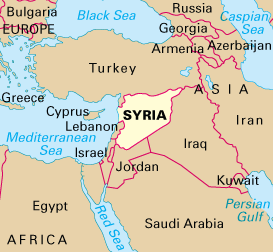



It was reported that within minutes a ground offensive by IS against the position retook the territory. Thus the U.S. bombing aided IS.
The Sept. 17 air raid came five days into a ceasefire brokered by the U.S. and Russia. Less than 48 hours after this provocation, the ceasefire was set to enter a new phase of cooperation between the U.S. and Russia in fighting the reactionary terrorist group. Then on Sept. 27-28, the U.S.-led coalition bombed two bridges spanning the Euphrates River in Deir ez-Zur.
The Sept. 17 raid made two things abundantly clear to the world: The Pentagon directly supports IS in a bid to destabilize Syria, and Washington has no interest in any diplomatic solution.
Though this attack marked the true end of the ceasefire, a humanitarian aid convoy was bombed two days later. Washington hastily blamed that on Russia and accused Moscow of sabotaging the ceasefire. Russian officials denied these allegations and publicly stated that the U.S. is directly supporting terrorism in Syria.
The United States claimed the strikes against Syrian soldiers were unintentional, but simultaneously renewed its call for the destruction of the Syrian state.
Syrian offensive
Following the collapse of the ceasefire, the Syrian army and its allies have embarked on offensives across the nation with help from Russian airstrikes. The focal point of this push has been Aleppo, Syria’s largest city, which has been torn between the government and reactionary terrorist groups for four years.
Aleppo is a stronghold of the al-Nusra Front, the al-Qaida branch in Syria. Washington condemns the Syrian army’s attacks against the al-Nusra Front, claiming that the “moderate” opposition fighters need time to separate from al-Nusra. U.S. spokespeople stipulate this precondition for an agreement, without specifying who “moderate” rebels are and despite the U.S. having taken responsibility for their separation from al-Nusra Front terrorists as part of the sabotaged ceasefire deal.
Aleppo has also become the crux of the U.S. media propaganda campaign against the Syrian state. Every day in the corporate media someone sheds crocodile tears for Aleppo and falsely portrays the situation as Syrian jets bombing “civilians” and “freedom fighters” starving for democracy. Meanwhile, Washington can’t name a single such group on the ground except for the phantom “Free Syrian Army.”
U.S.-Russia confrontation?
Russia has doubled down on its public commitment to Syrian sovereignty. Moscow deployed S-300 air defense systems in Syria following the end of the ceasefire and said Russia will not hesitate to use them against any aircraft threatening Syrian or Russian soldiers. On Oct. 7 the Russian State Duma unanimously approved an agreement between the Syrian Arab Republic and the Russian Federation allowing the indefinite deployment of Russia’s air force in Syria.
The U.S. State Department’s open threats against the Syrian state have led to a new level of brinkmanship with Russia.
Many analysts ask if recent Syrian offensives with Russia’s help aim at capturing key territories before the next U.S. president takes office. Even if this isn’t the case, the Syrians are clearly trying to beat the clock of Pentagon war preparations.
Turkey’s role
Under the radar of most corporate media, on Oct. 1 the parliament of NATO member Turkey, Syria’s northern neighbor, extended its mandate allowing the Turkish army to send ground troops into Syria and Iraq for the third year in a row. Turkey has played a key role in the destabilization of Syria by facilitating training, border crossing, oil trade and many other services to the reactionary terrorists, with IS as the key beneficiary.
In spite of this role, the Turkish regime claims to be in Syria to fight IS. But the Turkish army has mainly targeted the Kurdistan Workers Party (PKK), which carries on an armed struggle in defense of the Kurdish people and which has been among the strongest fighters against IS.
Turkey’s contradictory role in Syria has led to blowback within Turkish society, causing instability and threatening civil war. Turkey has been plagued by terrorist attacks, apparently by IS, within its borders. And the Turkish army has targeted ethnically Kurdish areas in the southeast of the Turkish state with brutal destruction.
Complicating this further, a failed coup in Turkey in July was followed by massive purges of public institutions, with tens of thousands of soldiers and government workers arrested. Further steps to partition the war-torn Syrian nation have the potential to bring both states toppling down — and perhaps others.
Role of anti-war movement
Above all else right now, it is imperative that anti-war activists around the world defend Syria’s sovereignty in the face of this heightened aggression from the United States. The world can expect new escalations of U.S.-backed forces on the ground in Syria, along with sophisticated propaganda campaigns in corporate and social media.
While the Syrian state faces this unprecedented colonial onslaught from Western powers, their allies and proxies, it is the duty of anti-war activists in the United States to expose U.S. imperialism’s role and stand firmly in solidarity with Syria’s self-determination.
Workers World calls on all students who have citizen rights in the United States and…
Members of the Columbia University Irving Medical Center (CUIMC) in New York City held a…
Trans Day of Visibility, started in 2010 by Transgender Michigan leader Rachel Crandall, is commemorated…
The corporate press in both the United States and France present the political situation in…
By Benny Schaft The U.S. billionaire-led ruling class has officially declared war — not just…
By Oren Ziv This interview was posted on March 24, 2025, at 972mag.com. Ella Keidar…